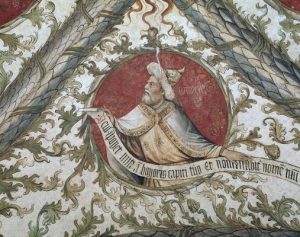Ord Om ordet
Listen Today
This homily was given in German as part of a retreat for priests at Maria Rosenberg. You can find an English version by scrolling down.
Baruch 1.15-20: Integrity belongs to the Lord our God.
Luke 10.13-16: Woe to you, Chorazin! Woe to you, Bethsaida!
Die Umstände des Buches Baruch sind tragisch. Die Chaldäer haben Jerusalem in Brand gesteckt. Der Tempel ist profaniert. Das Volk schmachtet im Exil.
Was intoniert Baruch dann — ein Klagelied?
Nein. Er erkennt das Leiden Israels zwar, verkündet aber: Der Herr, unser Gott, ist im Recht. Schamröte, sagt er, kommt uns ins Gesicht, denn “wir haben gegen den Herrn gesündigt, wir haben ihm nicht gehorcht”.
Leute, die der Religion fern stehen nehmen geläufig an, man werde gläubig um Bestätigung und Trost zu finden. Die Bibel bietet uns ein anderes Bild.
Der biblische Glaube ist nicht immer tröstend. Er konfrontiert uns mit der Wahrheit, mit ultimater Wirklichkeit. Das ist manchmal unangenehm, besonders wenn wir, bewusst oder unbewusst, mit Lügen und Illusionen alliert sind. Wir müssen uns dann erst uns selber stellen, Verantwortung nehmen für das Leben wie es ist.
Laufen Dinge schief, zerfällt Aufgebautes, zerstört sich Schönes, klagen wir spontan Gott und die Welt an. Von Baruch lernen wir stattdessen, Fragen zu stellen: Sind wir dem Herrn treu geblieben? Haben wir ihm gehorcht?
Die evangelischen Wehrufe über Chorazin und Betsaida zeigen in dieselbe Richtung. Wunderbare Dinge sind in diesen Städten geschehen. Christus, das Licht der Welt, hat dort seine Herrlichkeit offenbart, er hat seine Frohbotschaft verkündet.
Die Einheimischen merkten aber nichts davon. Sie hatten mit sich selbst — mit ihren Auffassungen, Vorurteilen, Plänen — genug.
Gott, durch dessen Wort die Welt geschaffen ist und gerettet, hört nicht auf, uns segensreich anzusprechen. Hören wir zu? Folgen wir seinem Ruf?
Wie der Invitatoriumspsalm uns täglich ermahnt: “Würdet ihr doch heute auf seine Stimme hören. Verhärtet euer Herz nicht!”
***
The circumstances of the Book of Baruch are tragic. The Chaldeans have set fire to Jerusalem. The temple is profaned, the people languishes in exile.
So what does Baruch do? Intone a lament?
No. He sees Israel’s pain, but affirms that the Lord has acted with integrity. We meanwhile blush for shame, he says, for ‘we have sinned in the sight of the Lord, we have disobeyed him’.
Non-religious people often assume that one takes to faith to be affirmed and comforted. The Bible paints a different picture.
Biblical faith is not always comforting. It confronts us with the truth, with ultimate reality. That is uncomfortable if we are allied, consciously or unconsciously, to lies and illusions. We must, then, confront ourselves and take responsibility for our lives as they have turned out.
When things go awry, when what we we have built up collapses, when lovely things wilt, we readily look for someone to blame, be it God himself. Baruch teaches us instead to ask: Have we stayed faithful to the Lord? Have we obeyed him?
The woes proclaimed in the Gospel on Chorazin and Bethsaida point in the same direction. Wonderful things had taken place in those two cities. Christ, the Light of the world, had revealed his glory there and proclaimed the Good News.
The locals, though, had noticed nothing. They had enough with themselves, with their opinions, prejudices, plans.
God, by whose Word the world was made and redeemed, does not cease to speak to us and call us. Are we listening? Do we follow his call?
As the Invitatory Psalm exhorts us daily: ‘Oh that today you would listen to his voice. Harden not your heart!’

The Prophet Baruch from the Loggia d’Annunciazione by Giusto d’Allamagna (ca.1451) in Santa Maria di Castello, Genoa.
